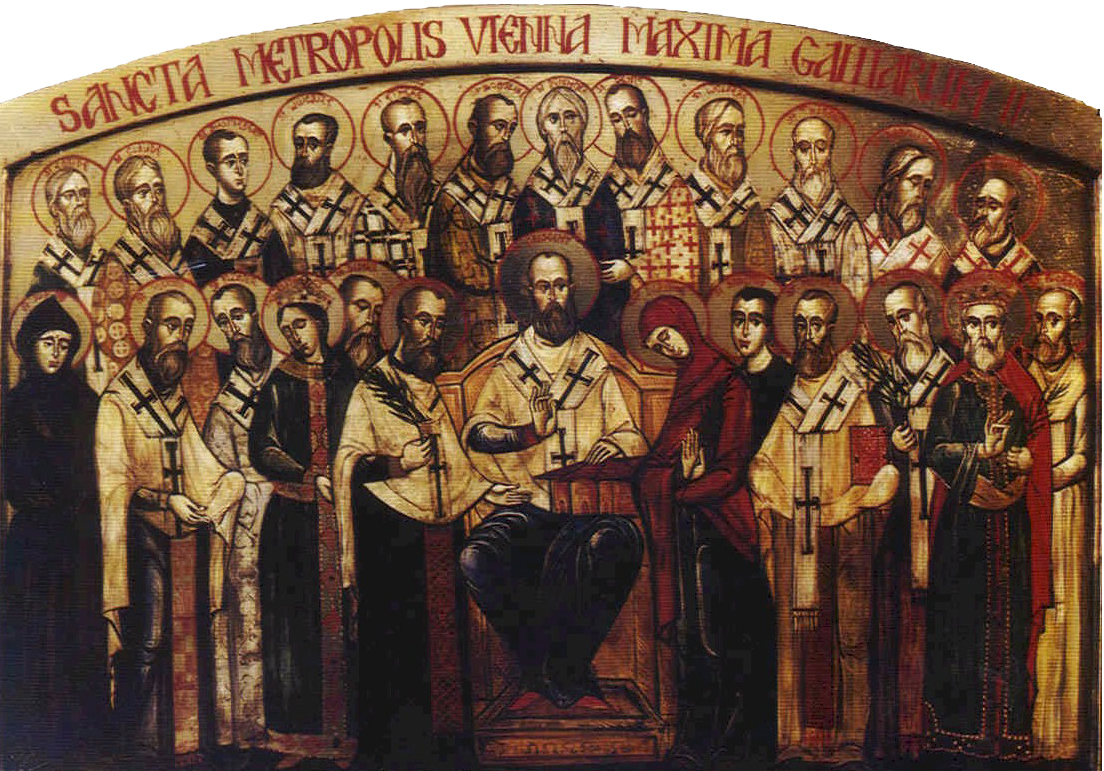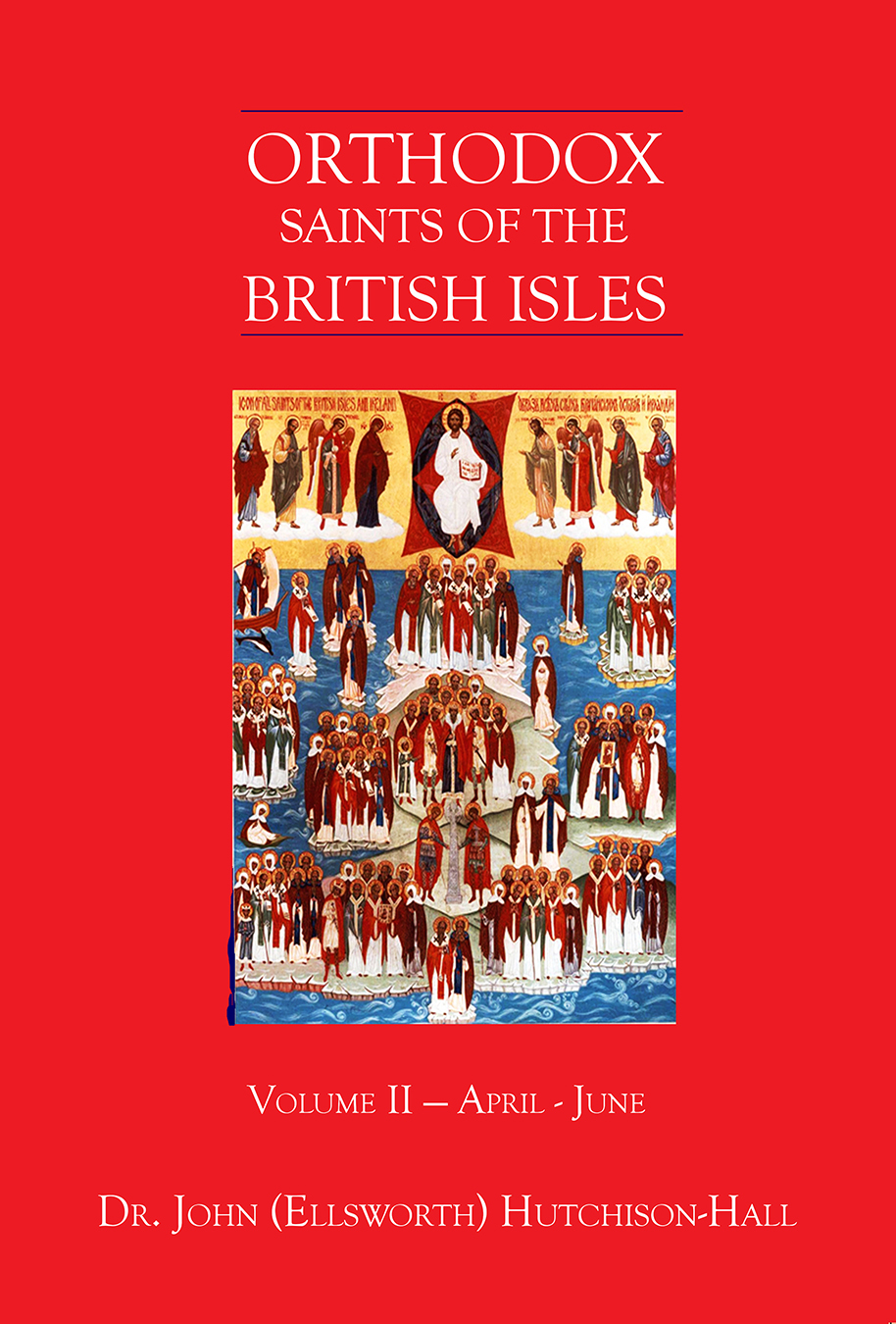
Orthodox Saints of the Pre-Schism
See of Rome
23rd April (NS) — 10th April (OS) 2023
BEDE the YOUNGER, a high-ranking courtier in the Court of Charles II (the Bald), Emperor and King of France (r. 843–877). After decades of faithful service to the King, St. Bede left the world and received monastic tonsure at a monastery in Gavello, southwest of Venice (north-eastern Italy). Although he was offered a bishopric several times, St. Bede refused on the grounds that he was not worthy. St. Bede reposed in 883.
BEOCCA of CHERTSEY, ETHOR of CHERTSEY, and COMPANIONS, the sack of England, and in particular the monasteries, by the Danes claimed many lives including SS. Hedda, Theodore and Companions (9th April). To the number of martyrs, we must add SS. Beocca, Abbot; Ethor, priest-monk; and some ninety monks at Chertsey Abbey in Surrey in 869.
MACARIUS of ANTIOCH, an Archbishop of Antioch who resigned his See, and following a pilgrimage to the Holy Land, set off to enlighten pagans in the west. He travelled north through Dalmatia (south-west Croatia) and Bavaria (southern Germany), preaching the Gospel and earning a reputation as a wonderworker along the way. St. Macarius finally settled in Ghent in present-day Belgium at the Abbey of St. Bavo (Sint-Baafsabdij). Where he remained for the rest of his life, reposing in 1012.
MARTYRS of CARTHAGE, a group of fifty Christians during the Decian Persecution (250–251) who were tortured by imprisonment with snakes and scorpions, before being martyred by beheading in Carthage, Africa Proconsularis. Of these fifty martyrs only the names of these six are still known:
Africanus, Alessandro, Massimo, Pompeius, Terence, and Teodoro.
MARTYRS of OSTIA, a group of criminals who were baptised by Pope St. Alexander I (3rd May) during his imprisonment. They were martyred circa 115 by drowning after being taken to Ostia near Rome and put on board a boat which was then sunk at sea. Some sources list them as Martyrs of Rome.
PALLADIUS, an Abbot of the Abbey of St. Germanus of Auxerre (abbaye Saint-Germain d'Auxerre) in Auxerre, Burgundy (east-central France), St. Palladius went on to serve as Bishop of Auxerre, and was the founder of several monasteries. He reposed in 661.
Get your copy of Orthodox Saints of the British Isles today.
Available at Amazon or your favourite e-bookstore.
ADALBERT (VOITECH) of PRAGUE, a Bohemian (present-day Czech Republic) noble who was converted and educated by St. Adalbert of Magdeburg (20th June), whose name he later took. Consecrated Bishop of Prague (present-day Czech Republic) in 982, St. Adalbert was forced to flee his See a few years later due to opposition from the local nobles. He went to Rome where he stayed at the Abbey of St. Boniface, and whilst there received monastic tonsure. St. Adalbert was sent back to his See by the Pope John XV (r. 985–996), and once again he was forced to flee. He appealed to Pope John and was given a blessing to evangelise in Pomerania (Poland/Germany), Poland, Prussia Germany), Hungary, and Russia, which proved to be fruitless. St. Adalbert along with his missionaries were martyred near Danzig in Pomerania (present-day Gdansk, Poland) in 997.
FELIX of VIENNE, ACHILLEUS of VIENNE, and FORTUNATUS of VIENNE, a priest, and two deacons sent by St. Irenaeus of Lyons (28th June) to enlighten the area around Vienne (south-eastern France). There they were arrested and subjected to numerous horrific tortures, and finally martyred in 212.
GERARD of TOUL, a native of Cologne in present-day North Rhine-Westphalia, Germany and member of the nobility. After witnessing his mother struck dead by lightning St. Gerard dedicated his life to prayer and penance. St. Gerard was consecrated Bishop of Toul (north-eastern France) in 963. As bishop, he defended his diocese from secular interference, rebuilt the Cathedral (though the current Cathedral dates from 1447), and established monasteries with schools attached staffed by Greek and Irish monks. St. Gerard reposed in 994.
IBAR (IBERIUS, IVOR) of MEATH, (Fifth Century), one of the missionaries (along with SS. Cearan the Devout (14th June), Ailbe of Emly (12th September), and Déclán of Ardmore (24th July) who are considered by many to have preceded St. Patrick (17th March) in the conversion of Ireland, though others believe that St. Patrick (17th March) ordained him. St. Ibar strived to spread the Gospel in Leinster and Meath, and built a monastery at Begerin, Co. Wexford, which attracted many monks, including his nephew St. Abban of Kill-Abban (16th March). In his Litany, St. Ængus the Culdee (11th March) invokes the “Three thousand confessors” who assembled themselves under St. Ibar’s rule. He is believed to have reposed circa 500, and his relics were enshrined at the monastery at Bergerin.
MAROLUS of MILAN, of Syrian birth, St. Marolus moved to Rome in early adulthood. There he became good friends with Pope St. Innocent I (28th July), and in 408 was consecrated Bishop of Milan (north-western Italy). St. Marolus served his See until his repose in 423.
PUSINNA of CHAMPAGNE, (Fifth Century), a maiden who spent many years living as a hermitess in her parent’s house in Binson, present-day Binson-et-Orquigny, Marne in north-eastern France, where she and her six sisters formed a religious community.
Prior to the Schism the Patriarchate of Rome was Orthodox, and fully in communion with the Orthodox Church. As Saint John of Shanghai and San Francisco +1966 said “The West was Orthodox for a thousand years, and her venerable Liturgy is far older than any of her heresies”.
Details of British Saints excerpted from Orthodox Saints of the British Isles.
Details of continental saints from these sources.
In many cases there are several spelling versions of the names of saints from the British Isles. I use the Oxford Dictionary of National Biography version as the primary version with the more prevalent version in parenthesis e.g. Ceadda (Chad) of Lichfield.

